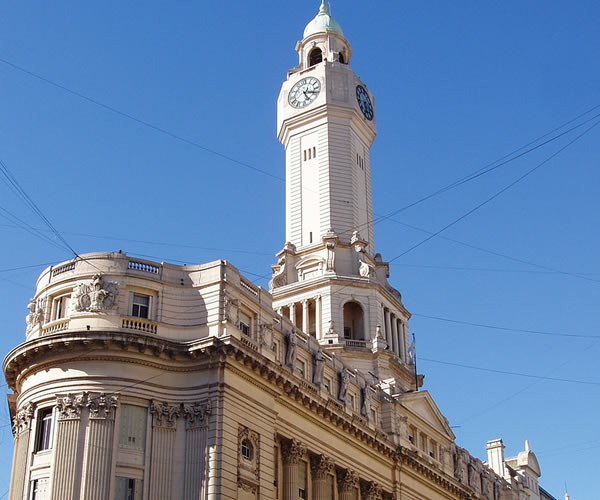
Argentina's political framework is a federal presidential representative democratic republic, in which the President of The Argentine Nation is both head of state and head of government, complemented by a multi-party system. The Argentine Constitution of 1853 mandates a separation of powers into executive, legislative, and judicial branches at the national and provincial level. The President and Vice President are directly elected to four-year terms and are limited to two terms. Cabinet ministers are appointed by the president.
Legislative power rests in the bicameral National Congress or Congreso de la Nación, consisting of a Senate (Senado) of seventy-two seats, and a Chamber of Deputies (Cámara de Diputados) of 257 members. The Argentine Legislature, Buenos Aires. Senators serve six-year terms, with one-third standing for reelection every two years. Members of the Chamber of Deputies are directly elected to four-year terms by a system of proportional representation, with half of the members of the lower house being elected every two years. A third of the candidates presented by the parties must be women.
The judiciary is independent of the executive and the legislature. The Argentine Supreme Court of Justice has seven members who are appointed by the President and confirmed by the Senate. All other judges are appointed by the Council of Magistrates of the Nation, a secretariat composed of representatives of judges, lawyers, the Congress and the executive.
Argentina is a member of an international block, Mercosur, which has legislative supranational functions. Mercosur is composed of five full members: Argentina, Brazil, Paraguay, Uruguay and Venezuela. It has five associate members without full voting rights: Bolivia, Chile, Colombia, Ecuador and Peru. After a history of political instability, Argentina now has a relatively stable government. The crime rate is among the lowest in the region; however street crime in larger cities such as Buenos Aires is still a significant problem for both residents and tourists. .
Argentina is divided into twenty-three provinces (provincias; singular provincia), and one autonomous city (commonly known as the capital federal, but officially Ciudad Autónoma de Buenos Aires). Though declared the capital of Argentina in 1853, the city did not officially become the capital of the country until 1880. During the presidency of Raúl Alfonsín, a law was passed ordering the transfer of the federal capital to Viedma, a city in the Patagonian province of Río Negro. Studies were underway when economic problems halted the project in 1989. Though the law was never formally repealed, it is now treated as a relic.
Provinces are divided into smaller secondary units called departamentos (departments), of which there are a total of 376 in Argentina. Buenos Aires Province has 134 similar divisions known as partidos. Departamentos and partidos are further subdivided into municipalities or districts. In descending order by number of inhabitants, the major cities in Argentina are Buenos Aires, Córdoba, Rosario, Mendoza, Tucumán, La Plata, Mar del Plata, Salta, Santa Fe, San Juan, Resistencia and Neuquén.
The Executive Office of the city of Buenos Aires is held by the Chief of Government (Jefe de Gobierno), elected for a four-year term who presides over the 60 member Legislature along with a Deputy Chief. Each member of the legislature is elected for a four-year term; half of the legislature is renewed every two years. Elections use the D'Hondt method of proportional representation. The Judicial branch is composed of the Supreme Court of Justice (Tribunal Superior de Justicia), the Magistrate's Council (Consejo de la Magistratura), the Public Ministry, and other City Courts. The national judiciary determines the autonomy of the city's judiciary with regard to common law, while the national executive branch controls the city’s police. Beginning in 2007, the city created new communes (comunas) managed by a seven-person elected committee. Buenos Aires is represented in the Argentine Senate by three senators (as of December 2007: María Eugenia Estenssoro, Samuel Cabanchik and Daniel Filmus).The people of Buenos Aires also elect 25 national deputies to the Argentine Chamber of Deputies.
Update 29/05/2009
Keep more of your money when transferring funds overseas!

If you want to move money abroad, from Argentina or to Argentina for example, Fexco provides efficient and secure global bank to bank transfers and bespoke payment solutions for both business and personal clients.
Why Fexco
Fexco provides a secure international money transfer service online or by telephone with bank beating fx rates and low fees. Specialises in high-value transfers.
Main characteristics
Fexco will help you to keep your overseas money transfer costs to a minimum.
| Margin | 0.6% |
|---|---|
| Regulator | FCA |
| Fee | £10 < £5K or Free > £5k |
| Mini | £1K |
| Ccy | All (130 currencies, incl ‘exotics’) |
| Services | Repatriation of funds, Property, Regular payments, High Value payments, spot, online, telephone. |
Get an online quote today
When you are ready to make your transfer, John and his team will be available to help you with better rates and an unrivalled service to make sure your funds are delivered securely and speedily.
